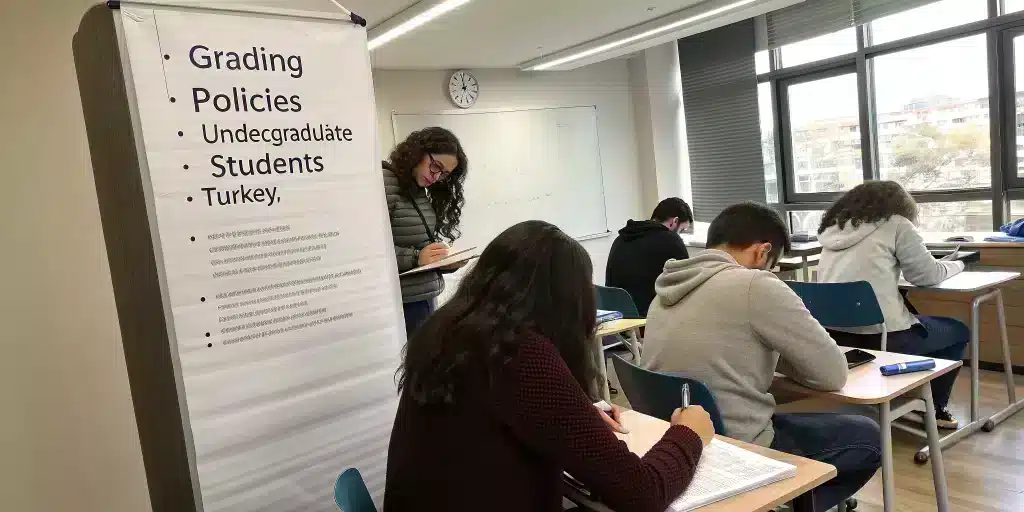Understanding Undergraduate Grading Policies in Turkiye
Overview of Grading Systems
Undergraduate grading in Turkiye is structured to offer a thorough evaluation of student performance through a combination of numeric scores, letter grades, and grade point averages (GPA). The two most frequently used grading systems in Turkiye include:
- The 100-point scale: This system assigns scores ranging from 0 to 100, where 100 is the highest achievable score.
- The 4.00 GPA scale: This scale provides a standard measure of student performance based on a four-point system.
Additionally, letter grades ranging from AA to FF are also employed to communicate how well students have performed academically. While some universities may utilize a different scale (such as a 5-point scale), the aforementioned 100-point and 4-point systems dominate the educational landscape in Turkiye.
Common Grade Conversion Table
| Letter Grade | Percentage Range | GPA Value | Description |
|---|---|---|---|
| AA | 90–100 | 4.0 | Excellent |
| BA | 85–89 | 3.5 | Very Good |
| BB | 80–84 | 3.0 | Good |
| CB | 75–79 | 2.5 | Fairly Good |
| CC | 70–74 | 2.0 | Satisfactory |
| DC | 65–69 | 1.5 | Passing |
| DD | 60–64 | 1.0 | Poor |
| FD | 50–59 | 0.5 | Conditional Pass |
| FF | 0–49 | 0.0 | Failing |
It is essential to note that grading policies may differ between universities, with various factors influencing the specific standards adopted in each institution.
Components of Grading
Grading in Turkish universities typically comprises multiple components, with the weightings varying by course and institution. Below are some common factors considered in determining final grades:
- Midterm Exam Results: Often represent approximately 40% of the total grade.
- Final Exam Results: Usually account for 60% of a student’s final grade.
- Additional Assessments: Class participation, assignments, projects, and, in some instances, attendance could also affect the final evaluation.
Due to these variable components, each university’s Senate or course instructors can determine the grading distribution, ensuring that evaluations reflect a comprehensive overview of student performance.
Application and Implications
The outcomes derived from these grading policies hold significant implications for students and educational institutions:
- Academic Decisions: Grades impact whether a student passes or fails a course, becomes eligible for graduation, qualifies for awards, and progresses to higher education levels.
- Transcripts: Both the 100-point and 4-point grading systems are represented on student transcripts, facilitating national and international verification of academic accomplishments.
- Minimum Requirements: Generally, students must achieve at least a 60% (or DD) in most undergraduate courses to successfully pass.
Special Notes
Some Turkish universities adopt norm-referenced assessment methodologies. Students with exceptionally high scores may receive an “AA,” while those falling below predetermined thresholds (such as those scoring less than 45%) might automatically receive an “FF.” This mechanism underscores the need for clear communication regarding grading standards to ensure fairness and transparency within educational environments.
Academic Landscape in Turkiye
With its rich history and commitment to educational excellence, Turkiye has become an attractive destination for international students. Universities such as Bahcesehir University, Medipol University, and Aydin University are renowned for their comprehensive academic programs and robust support for international students. These institutions follow the structured grading policies discussed and offer various undergraduate programs across numerous fields.
By actively engaging with a cohort of diverse students, these universities enrich their academic environments, contributing to a vibrant community that values global perspectives.
Take the Next Step with Study in Turkiye
Understanding the undergraduate grading policies in Turkiye is integral for successful navigation within the educational system. Study in Turkiye stands at the forefront, facilitating connectivity between international students and reputable Turkish universities. We play a pivotal role in promoting the advantages of studying in Turkiye while empowering educational institutions with effective recruitment strategies.

